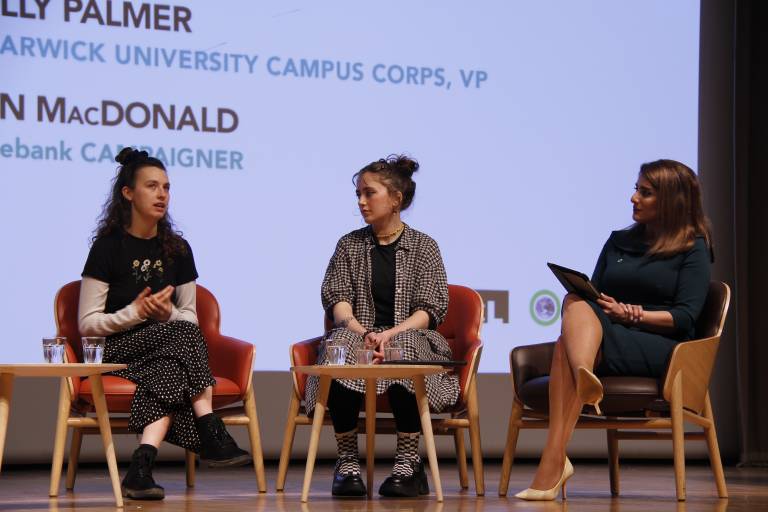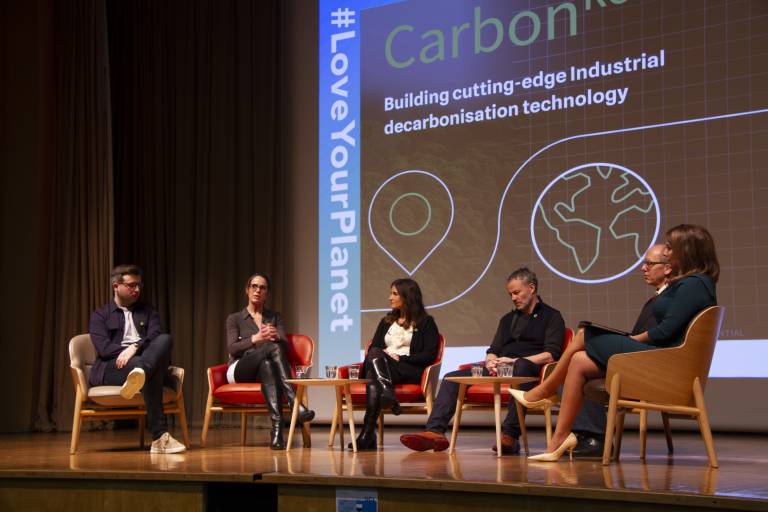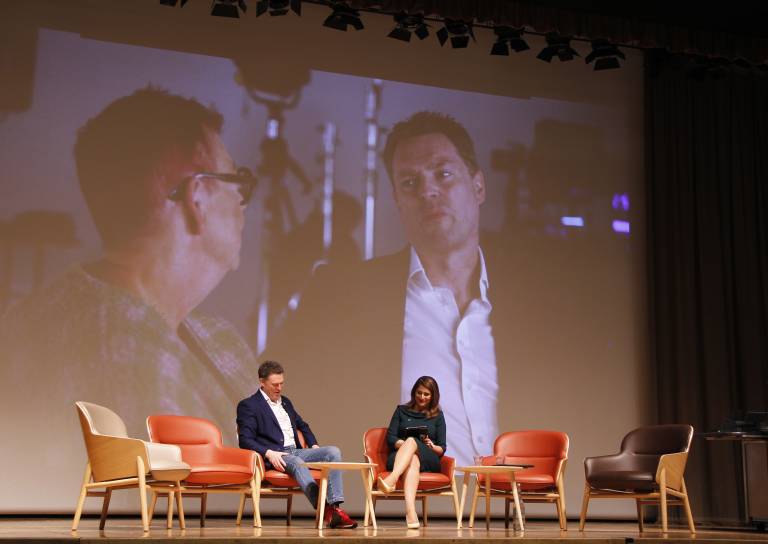Love Your Planet: A Day of Inspiration, Action, and Hope
27 March 2024
VPEE Student Writer, Anoushka Jain, attended UCL’s Love Your Planet – a ground breaking initiative organised by UCL in collaboration with the Climate Reality Project and Climate Café – to give you a snapshot review and provide key takeaways from the day.

Image: Lauren MacDonald and Louise Harris being interviewed by Shooka Bidarian.
Author: VPEE Student Writer, Anoushka Jain.
The Logan Hall at UCL's Faculty of Education and Society buzzed with anticipation on the 14th of February as the "Love Your Planet" event unfolded. Aiming to dissect the outcomes of COP28 and explore how the UK can accelerate its green transition, the event provided a prime spot for a day of connections, insights, and action.
The day kicked off with an inspiring video address from Al Gore, the founder and chairman of the Climate Reality Project. Gore emphasised the collective responsibility to hold leaders accountable and to shift the global energy transition into overdrive. He urged policymakers, businesses, and individuals alike to take real action, stressing that the solutions are already available, cheaper, and better. The former US vice president filled the room with hope, stating, "We don't need to wait; we can act now."
The event unfolded through a carefully crafted agenda, covering critical areas such as COP28 outcomes, the role of businesses, policymakers, and communities in driving the green transition.
Discover outcomes from COP28
From the first session itself, which centered around COP28 outcomes, I gained invaluable insights. Professor Priti Parikh, an expert in Infrastructure Engineering and International Development at UCL, illuminated the vulnerabilities and challenges related to equal access encountered by developing countries. Additionally, Simon Chin-Yee, a Lecturer in International Development at UCL, contributed a political dimension to the discourse, underscoring the significance of COP processes in addressing the unique needs of vulnerable nations. Through their perspectives, I deepened my understanding of the intricate dynamics surrounding climate negotiations and their impact on nations striving for sustainable development.
What is the role of businesses in driving the Green Transition?
The second session, exploring the role of businesses, featured insightful comments from industry leaders. Buffy Price, Co-founder of Carbon Re, stressed the importance of accountability, stating that monitoring, reporting, and accountability are crucial but often used as excuses for inaction. Milan van der Meulen, Founder of Soly, highlighted the vital role of entrepreneurship, emphasizing its power to bring real change and solve the climate crisis. Together, these learnings provided a nuanced view of the complexities and opportunities within the business sector's engagement with environmental sustainability, critical for students considering jobs within business.

Image: Business panel being interviewed by Shooka Bidarian.
What is the role of policymakers in driving the Green Transition?
The third session focused on the role of policymakers, showcasing diverse perspectives. Shirley Rodrigues, Deputy Mayor of London, discussed the need for a collaborative, bottom-up approach, stating, "This can't be a top-down delivery to people; it has to engage with locals." Tone Langenge, Senior Policy Advisor at the Tony Blair Institute, highlighted the importance of cross-party collaboration and understanding local contexts for on-the-ground change. These perspectives from the session equip students with a more holistic and practical understanding of policymaking, emphasizing the real-world complexities involved in creating meaningful and effective change.
Keynote fireside chat and closing remarks
The Fireside Chat with Prof. Mark Maslin, translated humorously by comedian Jo Brand, added a light touch to the serious discussions. Maslin's message focused on the importance of communication and hope. He summarized humanity's capacity to change and address the climate crisis, stating, "We have all the solutions, and we can reduce our harm." The Fireside Chat provided encouragement for students to be agents of change but also emphasised the role of effective communication, hope, and creativity in addressing global challenges.

Image: Mark Maslin and Shooka Bidarian in ''fireside chat''.
What is the role of community in driving the Green Transition?
The penultimate session celebrated the role of communities and activists. Louise Harris, Singer/Climate Activist, moved the audience with a soul-stirring song about climate change, undeniably one of the standout moments during the event.
Mary McHarg, The President of UCL Students’ Union and UCL Student rep at COP28, provided a unique perspective on youth engagement and media. The session left attendees inspired and reminded of the power of grassroots movements. For students, it serves as a reminder of the diverse ways we can engage with and raise awareness about crucial issues, emphasising the power of creative expression in advocating for change.
Closing remarks – So, what do we do?
The event concluded with closing remarks from Lisa Vanhala, PVP Climate Crisis at UCL. Her poignant question lingered in the air, "Given the state of the planet, what can I do with the knowledge, resources, capacity, and power that I have?''
For students, this question serves as a catalyst for self-discovery and personal responsibility. Vanhala's closing remarks underscore the importance of translating awareness into tangible actions, empowering students to become proactive advocates for a sustainable and healthy future.
A hopeful outlook
The day concluded with a networking session that saw fruitful collaborations and connections across traditional group lines. Attendees left the event hopeful and excited, fueled by the collective determination to act. The success of the event, with a diverse range of attendees and insightful discussions, marked a step towards a sustainable and healthy future.
As a student reflecting on this transformative day, I am inspired to initiate meaningful change. The event not only offered a stage for expert perspectives but also sparked a profound sense of responsibility within me. My biggest takeaway from the event was the accessibility of climate change action. Moving forward, students and staff can get involved by staying informed, joining climate-related initiatives on campus, engaging with SustainableUCL and advocating for sustainable practices.
The "Love Your Planet" event was not just a conference; it was a call to action, leaving us with the tools and motivation to be the change we want to see in the world.
Related links:
- UCL Climate Hub
- Sustainable UCL - Staff Action and Student Action
- UCL Sustainable Education
- Student's Union Climate Leaders
 Close
Close


